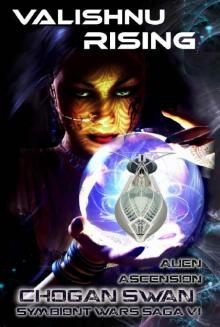- Home
- Chogan Swan
Fight for the Future Page 3
Fight for the Future Read online
Page 3
Kest smiled. Daniel had also waited a lot longer than necessary before letting Yasmin know he was interested in becoming more than just the big tough watchdog. Kest had been forced to have a man-to-man discussion with him to get him moving. Kest capped it off with a threat of physical violence if Daniel ever told Yasmin he’d said anything. The threat was pointless, of course. Daniel would have been mortified to tell Yasmin he’d needed a kick in the rear and—at 13 years old—Kest’s threat was ridiculous anyway. Daniel was a rock-hard Sergeant Major well versed in mayhem.
Kest slipped down the hall and closed the bathroom door behind himself, shucking the clothes from his body. His free-running on the way home had worked up a sweat. Since he’d ninja rolled out of some long drops, his clothes had also picked up plenty of dirt and sand... as usual.
Still hot from running, he showered cold, just getting wet before turning off the water to soap and scrub everywhere then rinsing. With his hands, he swiped most of the water out of his hair and off his body then finished up with a towel. In the mirror, he checked his face and hair. His skin, a light, ochre tan, still held a few drops of water, but scant body hair. No need to shave today either; thank you to dad’s Native American genetics. Kest grinned, showing even, white teeth. Thanks to both parents there. His mother’s Yazidi genes were responsible for his lighter skin and the brown wavy hair and hazel eyes. The dark blonde highlights though were courtesy of Arizona sunshine.
Kest ran a brush through his hair, which he kept short year round, though even shorter in the summer. It was too thick and hot otherwise, but it still needed brushing. He tossed the brush back in his doss kit on the wire shelves and picked up his pants to put them in the hamper, checking the pockets first. In his back pocket, he found a folded flyer. It was for a talk at the university tonight. He would have tossed it in the trash, but he spotted ‘Nighthawk’ jotted in the corner and remembered her brushing by him on the way out of the roda.
Hmm.
The dirty clothes landed in the hamper as he tucked the flyer into the towel wrapped around his waist and padded barefoot down the tile hallway to his room. The door opened with a bump from his hip. The contents of his room—big but crowded with a closet of martial arts equipment, bookcases, electronic piano, guitar, laptop and a standing desk—didn’t leave him much room. Still, he squeezed in and pulled some canvas pants from the dresser under his loft bed then slid the flyer into a back pocket before sliding into them and pulling on a clean t-shirt.
The laptop screen showed twenty-four email messages waiting for him, and he tapped the touch pad. Twenty were from his capoeira friends wanting to ask him about what had happened at the roda. He wrote a brief note saying he was considering all options and encouraging them to offer ideas too, copied it and sent it to all of them.
Three of the others were from people he knew through a chatroom at the SimSociety 2.0 gaming site, known among its players as SST. The first was from Nightowl, an admin of an SST chatroom saying she would be contacting him soon about a new opportunity.
Kest had gotten interested in SST three years ago after seeing an online interview called Coming to a Future Near You. The episode had gone viral with math and science nerds—a social group of which he was still a secret member.
The other two messages were from a private SST chatroom that had started three years ago with a discussion about a strange event in Maryland. Hundreds of people living seemingly normal lives had suddenly gone dark. Stories of black helicopters, SWAT teams, gunfire, then nothing. It all faded out except for a few word-of-mouth accounts. The discussion had been moved to a private chat when an admin had discovered that the event was being monitored by government intelligence agencies and the chat group was warned not to discuss it outside the chatroom to protect their own privacy. He didn’t put too much stock in the rumors, but it was cool to be in a secret group with supposed knowledge of conspiracy. It had added to his attraction for the game.
As a fourteen-year-old, Kest had first been attracted to SST because it let him play with science and was free. The basics came fast for him, and he enjoyed building worlds and competing online for model solutions. For a while he’d toyed with designing policies that hastened the decay of society, but that wasn’t challenging; it was just too easy. So, he’d visited the university library to read what he could find on Social Psychology and Systems Theory. The bibliographies and reading lists built into the game helped, but not all the books in the lists were in the library. Through the web forms, he suggested that SimSociety 2.0 offer an online library. Not only did they do it, they sent him a check for $500 for the suggestion. He’d used the money to buy his digital piano.
Kest ran his fingers along the piano keys at his side as he remembered.
The prize had boosted his interest in the game more. SST’s tutorials on System Dynamics and probability became his new hunting ground. They also offered free online classes in several subjects. You could work your way up to graduate level courses if you wanted. Kest’s online profile now had an undergraduate degree from the SST foundation with a double major in Social Psychology and Applied Mathematics with a focus on System Modeling. Mixed in there were many courses on Political Science and History too. The degree could transfer to his own identity if he wanted. But what he’d learned in his studies—and from the game models—about personal freedoms under the current government made him keep his head down out of habit. Incidents like today’s earlier encounter only reinforced that. Still, it was odd to have a college degree and still be missing his high school diploma.
A moment later, he stepped out of his room, pulling the shirt over his head.
He rounded the corner of the kitchen to see his mom and Daniel sitting at the counter with coffee cups in front of them. Yasmin’s hand rested on Daniel’s. The glitter of a new diamond ring on her left hand sparkled in the afternoon sunlight streaming through the kitchen window.
“I see how it is,” Kest said, laughing. “Okay, I won’t ask about the impact of marriage to your taxes from this decision, because I would never assume it’s anything but true love. But, if there’s anything I should know about, like a sibling on the way, be sure to tell me. Mom, the ring is beautiful, especially on you.”
Yasmin laughed and jumped up to hug Kest. “Thank you, dear heart,” she whispered in his ear. “You’ve always looked out for me, I know.” Her spoken English, always correct and fluent, chimed with the music of her native Kurmanji.
Daniel smiled, though to Kest his eyes seemed shadowed with worry. “I got a tip last week I’d be stationed to Germany soon, and I didn’t want to be away from your mom for two years,” he said. “I needed to get her name on my orders to make that happen. What we wanted to talk to you about is whether you want to come with us.” Daniel stood, taking his cup to the coffee machine where a fresh-brewed pot was steaming. “Do you want a cup?” he said, turning to glance at Kest.
“Yeah, thanks. Just a half cup though.” Kest sat at the counter. The idea of leaving made him feel the way he had the first time someone had challenged him to a full-contact mixed martial arts match. This time though it was which fight to take—with both being full-contact. He’d always wanted to visit Europe; his brush with the law and maybe a local cop with a video of his face, made the idea seem even more appealing.
Daniel placed a cup on the counter and slid it over to him. “I talked with your Grandpa and Grandma Tashquinth, and they were excited for the opportunity to have you come stay with them. But we’d also love to have you come with us. It would be a great experience for you to travel and see Europe. I know you could have passed the GEDs years ago. If you did that before you left, you wouldn’t even have to spend your time in Europe tied to a school desk. I don’t know why you didn’t do that a long time ago.”
Kest nodded, not sure he had a good answer. The idea wasn’t new to him. Every time the school system’s policies clashed with reason—multiple times a day in fact. But, he had friends, people who depended on him. A rush to wor
k a menial job or spend money on tuition to prove to some employer he had skills so he could be exploited had no appeal. He had time to do the things he cared about: music, capoeira and exploring new subjects. He took advanced courses online free on the school’s computers when he’d have to pay for access otherwise. But, he kept his grades in the B+ range and took half the courses under a fake identity to stay under the radar of the school’s nosy guidance department.
If he lived with his grandparents, he’d be on the reservation. It would be hard to get together with his music friends and the roda. “I’ll think about it,” he said. Though the answer seemed obvious between the two choices, the possibility that it wasn’t so straightforward nagged at him.
His mom drummed on the counter to get his attention. “What Daniel hasn’t said yet is that when he visited Germany, he located some of my family who escaped Da’esh four years ago. My sisters and my aunt made it out alive.”
“You mean they actually spoke to you after you married Dad?”
“All the men in my family were killed, my Kestrel. I sorrow for their deaths, but not the bondage of their ways. The women are more realistic. I spoke with them by internet today. I’m looking forward to seeing them face to face.”
Kest smiled for her. His mother had mourned the loss of her family when his dad had rescued her from the radical party that had abducted her in Baghdad. Their marriage at the end of his tour had offered a way for her to flee Iraq. It saved her life, but separated her from her family. When his dad signed up for another tour after three years stateside, Kest had been a toddler. He’d never seen his dad again. All he remembered of the sad Christmas was a closed coffin and the noise of the guns when the soldiers saluted twenty-one times.
As they talked, the light coming in the window dimmed as the sun sunk below the roof of the house behind them. Kest took his cup to the sink, rinsed it and put it in the drainer. “How soon do I need to let you know?” he said, leaving the kitchen to head back to his room.
“Soon,” Daniel said. “I need to know by Friday morning.”
Kest nodded, went back down the hall and squeezed into his room. The brochure from his pocket poked into his leg, and he pulled it out and unfolded it.
“Networking for Social Change,” said the brochure.
Curious.
Why would a young girl want to ask him to something like that? Well, he owed her. Owed her jumbo-sized for the distraction that had kept him out of jail. He pulled on his newest pair of free-running shoes and slipped into a black canvas hoodie. The meeting was in a small auditorium at the university. It wasn’t far. He could jog there without getting too sweaty.
Chapter 4 — Crowded Theater
Kest looked around the theater. He’d arrived early, but his smartphone had eBooks for him to read, so he was just fine, thank you. No boredom at all.
The talks here had been free entertainment since he was thirteen. His school ID granted him free access. Panel discussions on privacy, media... all had played a part in his awareness. As a child of parents from people groups from a long history of persecution, discrimination and attempted genocide—keeping track of societal trends was second nature to him. The book he was about to finish, Hayek’s The Road to Serfdom was a fascinating study in economic reasoning. What he found grim but amusing was wondering what Hayek would make of the world today’s inexorable march to serfdom even without the help of central planning.
More than one way to skin a serf.
He shut his phone down and laid his head back to rest his eyes and think.
“I’m glad you checked your pocket,” a voice whispered in his ear.
“I wanted to be sure I got the chance to say thanks.” Kest opened his eyes. Nighthawk’s face—upside down in relation to his—stared down at him.
“Aww! that’s sweet,” she said, vaulting the row of seats to sit next to him.
Her dark skin showed skillfully applied blush and eyeliner that made him consider raising his estimate of her age. “That could have been a disaster,” he said. “I’m afraid the cameras in the car might make it possible for them to ID you.”
Kest turned to face her. She’d changed from her ninjaesque outfit to a swirling black/red combination of harem pants, a loose top and a headscarf, all in a matching batik fabric. He put his hand on her arm. “Thank you.”
She smiled. “Kestrel, don’t concern yourself with that; I pulled my mask over my face before I even left the circle.”
“My friends call me Kest.”
“Kest then. My friends call me Ayleana. I’d be honored to have you among them.”
Kest hesitated. His estimates of her age kept seesawing back and forth. Ayleana’s physical playfulness and appearance pushed it lower while her sophisticated dress, vocabulary and speech bumped it higher. “Ayleana, I hope you don’t think I’m asking you this to put you in an age pigeonhole or anything, but how old are you? The estimator in my head is going crazy trying to figure it out.”
She smiled, pearly teeth flashing white. “Young body, old soul. Which one do you want to know?”
Kest shook his head. “Why don’t you just tell me an age that tells me how you want me to treat you?”
She leaned forward looking into his eyes. Her breath fell against his cheek like a feather’s caress. “Seventeen years, six months, five days,” she said.
Kest did the math to zero in on her birthday and jerked in surprise—June 10th! That was his birthday. How did she know? He didn’t have it on any social media.
“The meeting’s about to start,” she said.
Ayleana tucked her hand into the crook of his arm.
Kest nodded and turned to face the front. He put the question away, focusing on the stage where Brenda Sterne, a Business School department head, welcomed the audience and introduced tonight’s discussion panel—all of them still offstage.
Kest recognized the names from being here so often—all were professors or writers in subjects he followed. The faces, with bullet points of their accomplishments, came up on the screen at the back of the stage. The list included: Julia Brewster, a social psychologist; Bradley Pitcairn, a business professor focusing on entrepreneurship and Rachel Ashby, an Industrial Psychologist specializing in Organizational Behavior.
“... and a special surprise guest,” Sterne said. “Jonah Galt, of the SimSociety 2.0 foundation is here tonight—incognito as usual. He’ll present the latest developments in their online models and speak on a subject he is known for, disruptive societal models.”
A buzz from the audience greeted the announcement. Jonah Galt had become an icon on the internet over the past three years. Kest had followed Galt’s books and blogs since he’d first played SimSociety Turbo online three years ago. This was way more than he’d expected out of tonight’s talk.
Sterne pushed on, raising her voice to be heard above the noise. “He will have a few words for us first then will lead the panel discussion of our topic tonight which we’ve called, Not Just Glass for Ceilings.” Sterne raised her left hand in a presentation gesture toward stage right. “Please welcome our panelists with a warm round of applause.”
Kest drummed his hands together with the crowd as the first three panelists walked in and took their seats.
When Jonah Galt came out behind them dressed in a robe and sandals like Charleton Heston playing Moses in the old 10 Commandments movie, people laughed and clapped harder.
Galt raised his hands above his head, shaking back the beard and wig keeping his face raised to the ceiling.
Kest chuckled. The prophet Jonah indeed.
The crowd grew quiet.
Galt raised his hands higher. “Yet forty days and Nineveh shall be destroyed,” he intoned.
Laughter broke out again.
Galt smiled, his teeth showing through the beard wig. When it got quiet again, Galt looked at a tall coffee-colored woman standing just off stage guarding the stairs and said, “I told you they’d get it.”
“I think they were sti
ll laughing at your disguise,” she replied, voice flat.
This time the laughter took longer to fade. While waiting, Galt walked over to the other panelists, turned off his microphone and shook hands with each, exchanging a few words before crossing back to center stage.
He reached under his beard to turn the microphone back on. “Before we start the discussions, I want to say, thank you for coming out tonight. Especially the leaders from the communities of faith we’ve invited, and I assure you the discussion will be worth your time.”
Galt walked to center stage. “You might assume I’d pick a verse from the book of Jonah to illuminate our subject given my nomme de guerre, but instead I’ll quote from the book of Amos. Some of you might not be familiar with him, but Amos is recognized by several faiths as authoritative. And, if you don’t belong to one of them, just hear him out and decide for yourself. After all, I have a precedent in Martin Luther King Junior’s ‘I Have a Dream’ speech.”
He held up one hand over his head. “In the words of Amos from the fifth chapter at verse 24: ‘Let justice roll down like waters and righteousness like a mighty stream’.”
Galt paused, letting silence rule as the power of words from thousands of years ago resonated through the room. “In Chapter 8 verses 4 through 7, he makes it clear he is talking about the unfair treatment of the poor at the hands of the rich. Almost ten years ago, the Occupy Wall street Movement spoke that same message to the world and the inequity they protested has only gotten worse.”
He pointed to the panel. “Tonight Rachel Ashby will discuss the Culture of Cronyism in the corporate world that prevents upward mobility in the workplace. Julia Brewster will outline the dynamics of the increasing wealth gap between the super-rich and everyone else. Then the panel will all join Professor Bradley Pitcairn in a discussion of disruptive business models and opportunities for entrepreneurial investing as an alternative to Wall Street.”

 Valishnu Rising
Valishnu Rising 1799 Planetfall
1799 Planetfall Against That Shining Darkness: Boxed Set Trilogy
Against That Shining Darkness: Boxed Set Trilogy Thick Black Theory: A Symbiont Wars Book (Symbiont Wars Universe)
Thick Black Theory: A Symbiont Wars Book (Symbiont Wars Universe) Fight for the Future: Symbiont Wars Book III (Symbiont Wars Universe 3)
Fight for the Future: Symbiont Wars Book III (Symbiont Wars Universe 3) Sentients in the Maze: Symbiont Wars Book II (Symbiont Wars Universe 2)
Sentients in the Maze: Symbiont Wars Book II (Symbiont Wars Universe 2) Sentients in the Maze
Sentients in the Maze Fight for the Future
Fight for the Future